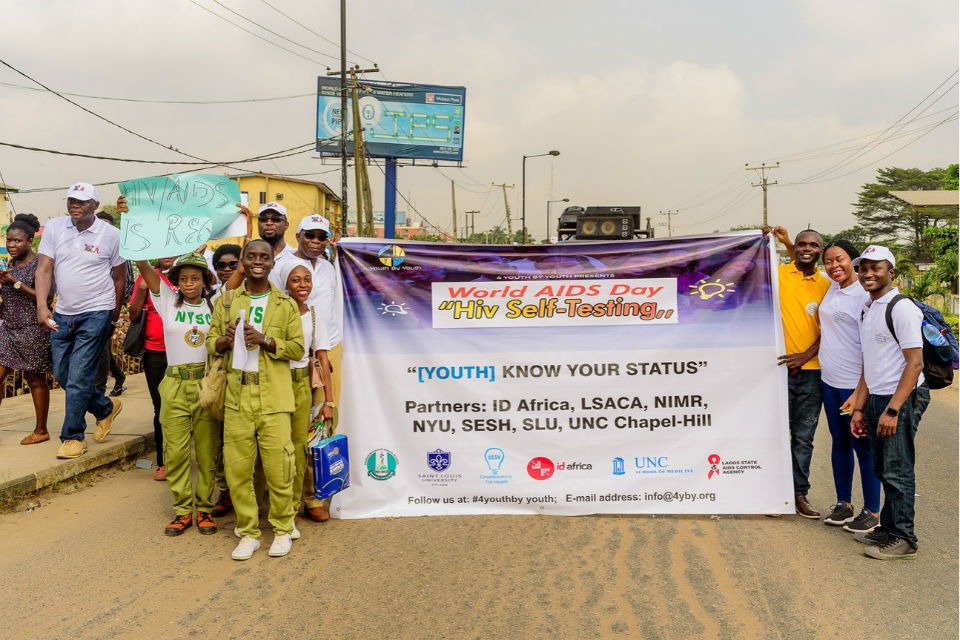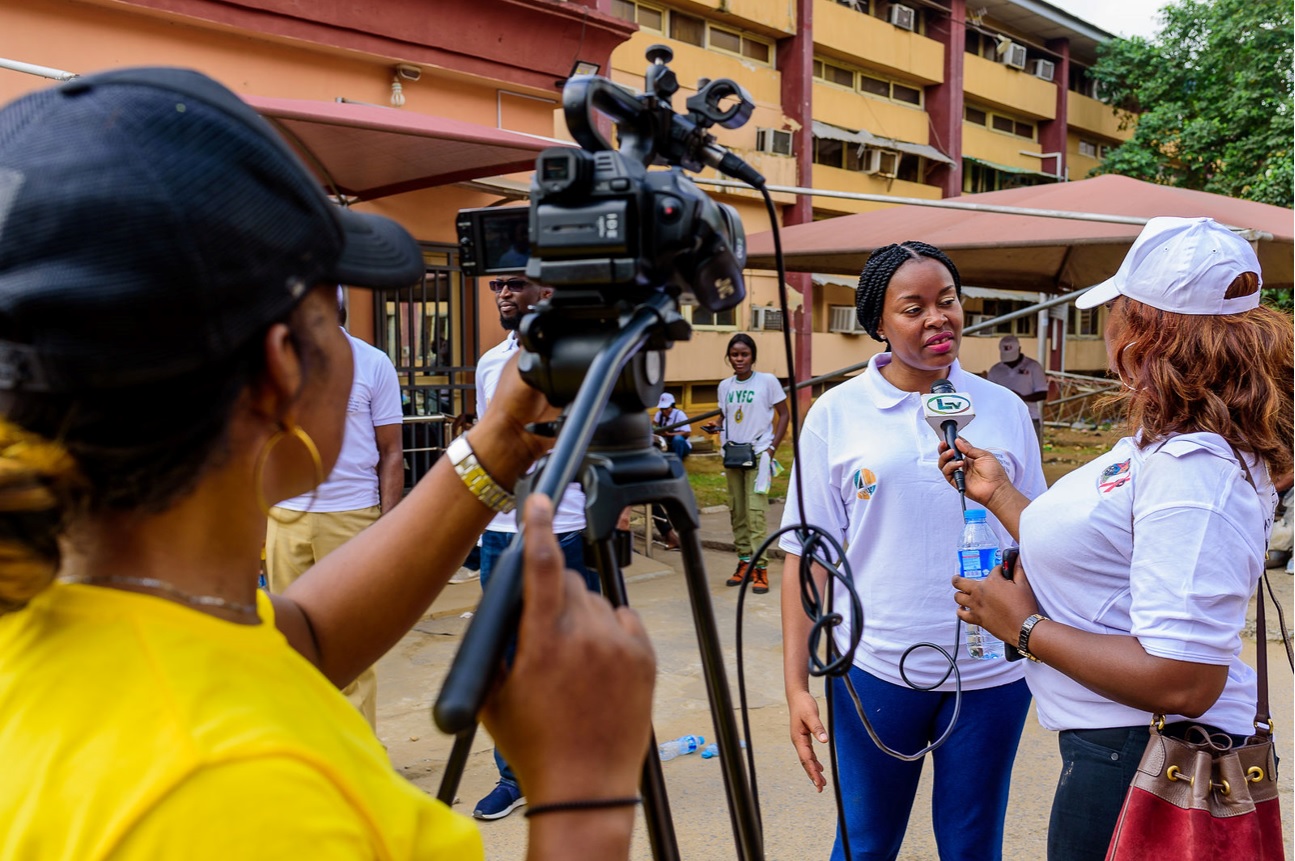2018 Equals Great Year for CPHSJ Research Funding
 The Saint Louis University College for Public Health and Social Justice was awarded
a record amount of funding from grants in 2018. As faculty members work behind the
scenes spearheading research projects to help both local and global communities, they
are impacting population-specific issues, promoting communities and transforming social
outcomes.
The Saint Louis University College for Public Health and Social Justice was awarded
a record amount of funding from grants in 2018. As faculty members work behind the
scenes spearheading research projects to help both local and global communities, they
are impacting population-specific issues, promoting communities and transforming social
outcomes.
Juliet Iwelunmor, Ph.D., was granted $2.3 million from the United States Institute of Health for the 4 Youth By Youth program, which addresses the HIV/AIDS epidemic in Nigeria.
Nancy Weaver, Ph.D., was awarded more than $340,000 from the Missouri Foundation for Health for Support Over Silence, a program that helps prevent child maltreatment. And Jin Huang, Ph.D., received a grant of more than $260,000 from the Kauffman Foundation to focus on improving the financial capability of low-income individuals.
“This is such an exciting time for the research programs in the College,” said Tom Burroughs, Ph.D., interim dean of the College for Public Health and Social Justice, adding that a recent $50 million gift from Rex and Jeanne Sinquefield to SLU has been transformational in taking the University’s research to the next level.
"The faculty within CPHSJ are among the most productive in the University and will benefit tremendously from this gift," he said. "It will support ‘Big Ideas’ for new research programs and enable us to recruit nationally known faculty. I couldn’t be more excited.”
Below are details of a handful of the grants CPHSJ received this year, and the impact these programs are having around the globe.
4 Youth By Youth
Juliet Iwelunmor, Ph.D.
Grant: $2.3 million
Source: United States Institute of Health (NIH), Eunice Shriver National Institute of Child
Health and Human Development (NICHD)
Goal: To increase uptake of HIV testing and prevention services among youth
 Twenty percent of all youth in Nigeria are unaware of their HIV/AIDS status. Nigeria
also has one of the highest rates of new HIV infection in Africa, after South Africa
and Uganda. Each year, 200,000 Nigerians are infected with HIV, according to UNAIDS.
Of these, almost 80,000 include young men and women. The reasons for refusing to be
tested include the fear of stigma, discrimination, and a lack of privacy regarding
the results.
Twenty percent of all youth in Nigeria are unaware of their HIV/AIDS status. Nigeria
also has one of the highest rates of new HIV infection in Africa, after South Africa
and Uganda. Each year, 200,000 Nigerians are infected with HIV, according to UNAIDS.
Of these, almost 80,000 include young men and women. The reasons for refusing to be
tested include the fear of stigma, discrimination, and a lack of privacy regarding
the results.
Iwelunmor is the principal investigator of the NIH, NICHD funded I-TEST (Innovative Tools to Expand Youth-Friendly HIV Self-Testing), known locally as 4 Youth By Youth (4YBY), with the goal to help address this paramount issue among youth in Nigeria. The mission is to ensure all youth in the country know their HIV/AIDS status. She advocates for the uptake of HIV self-testing, informing young people that it’s safe, convenient, and will allow them to know their status in privacy.
She works closely with a team of researchers, including co-founder Dr. Oliver Ezechi of the Nigerian Institute of Medical Research, Lagos (NIMR), and Dr. Joseph Tucker of the University of North Carolina, Chapel Hill. Throughout the past few months, the team has traveled throughout the country promoting efforts through widely popular contests, walkathons, educational opportunities and events.
“We intentionally called ourselves 4 Youth by Youth because we view young people not only as beneficiaries, but most importantly as partners and leaders with promoting HIV self-testing among their peers," Iwelunmor said. "If we are to truly achieve that vision of an AIDs-free generation, then it should begin with young people leading the way.”
4 Youth By Youth has been featured throughout the press and media in Nigeria, and Iwelunmor and her team have participated in press conferences and conducted numerous interviews designed to increase awareness and the importance of HIV self-testing among young people in Nigeria.
For more information about I-TEST or 4 Youth By Youth, contact Juliet Iwelunmor, Ph.D., at juliet.iwelunmor@slu.edu.
Support Over Silence
Nancy Weaver, Ph.D.
Grant: $341,000
Source: Missouri Foundation for Health 
It’s when a frustrated mom lashes out at her 4-year old son who is throwing a tantrum in the doctor’s office waiting room. It’s an angry dad yelling at his 6-year old daughter in the parking lot because he’s late for work. It’s when we see parents or caregivers struggling with their children as they cope with everyday stressful situations.
With Support Over Silence, Nancy Weaver, Ph.D., is focusing on training community members and hospital personnel on how to confidently diffuse such challenging situations, and prevent the possibility of child maltreatment.
The result of a partnership between Saint Louis University, FamilyForward, SSM Health Cardinal Glennon Children’s Hospital and Safe Connections, Support Over Silence provides programs in a variety of settings. These include universities and community and health care organizations.
The program is focused around the “bystander effect,” which is when people see something happening in public but don’t get involved because they think someone else will instead. In this program, trainees will learn how they can support struggling parents.
The program offers in-person training, including interactive modules, to increase participants’ confidence to intervene, reduce intervening barriers, increase the awareness of the need for intervention, and help participants to feel positive about intervening to help parents and protect children.
The action-focused program begins in January 2019. For more information about Support Over Silence, or to schedule a training, contact Nancy Weaver, Ph.D. at nancy.weaver@slu.edu.
Financial Capability: Fostering Entrepreneurship Among Low-Income Individuals
Jin Huang, Ph.D.
Grant: $260,374
Source: Kauffman Foundation
Goal: To provide a framework of services improving the financial capability of low-income
entrepreneurs

Those in low-income or vulnerable populations often want to improve their financial situations. However, many lack the education, skills and resources to do so, forcing them and their families to continue to struggle.
Jin Huang, Ph.D., and collaborators from the University of Missouri St. Louis and Washington University are working together to build a financial capability framework to help make improving financial status a reality for this specific group. The team received a grant from the Kauffman Foundation to provide research on low-income entrepreneurs and their financial capabilities.
“We want to help those in this group to learn to accumulate wealth, increase their assets, and improve their finances,” Huang said, adding that these efforts will improve their housing status, job levels and businesses overall.
Huang said the research team will first identify which types of services are needed, such as those related to credit score education, and develop new services. The research, he said, “will provide a new perspective to an old problem.”
For more information about this program, contact Jin Huang, Ph.D, at jingting.huang@slu.edu
About the College for Public Health and Social Justice
The Saint Louis University College for Public Health and Social Justice is the only academic unit of its kind, studying social, environmental and physical influences that together determine the health and well-being of people and communities.
It also is the only accredited school or college of public health among nearly 250 Catholic institutions of higher education in the United States. Guided by a mission of social justice and focus on finding innovative and collaborative solutions for complex health problems, the College offers nationally recognized programs in public health, social work, health administration, applied behavior analysis, criminology and criminal justice and urban planning and development.